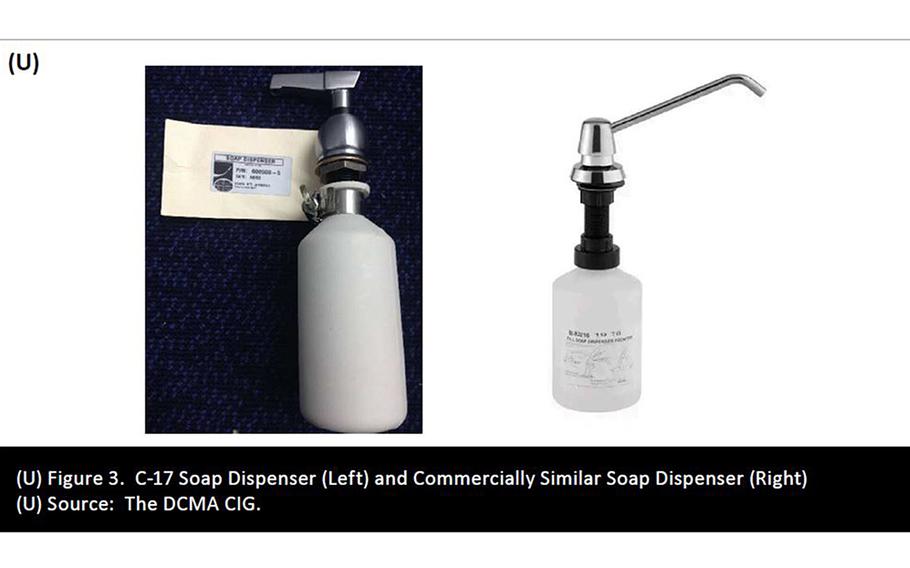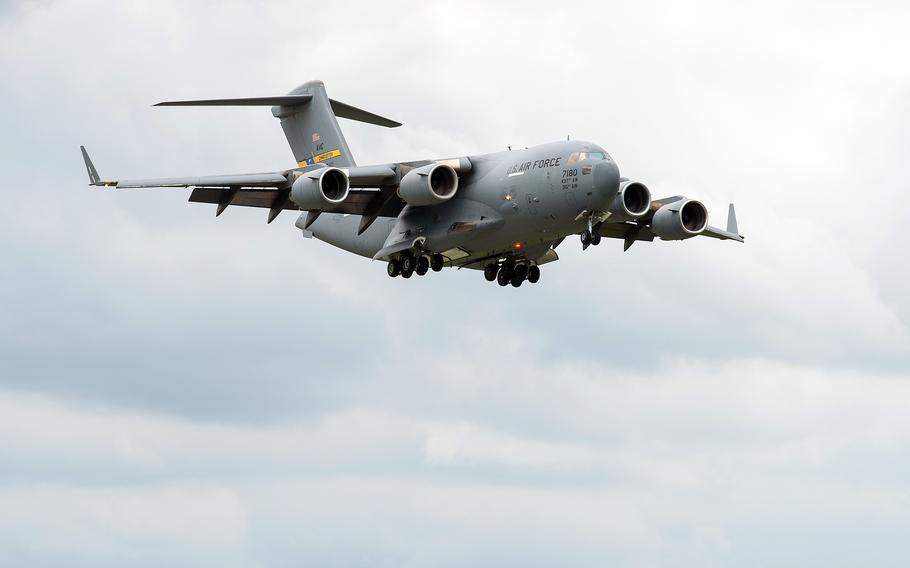
An image from the Defense Department Inspector General's audit shows a C-17 Globemaster III soap dispenser, left, and a similar commercial dispenser. The Air Force overpaid by more than 80 times for soap dispensers in the bathroom of the airplane, the IG said. (Defense Contract Management Agency)
The Air Force paid over 80 times more than it should have for lavatory soap dispensers on one of its most versatile cargo planes, a significant part of nearly $1 million in wasteful spending, a watchdog agency concluded in a new audit.
The findings by the Defense Department Inspector General reveal a series of procurement missteps that allowed defense giant Boeing to overcharge for various components of the C-17 Globemaster III.
While the price of each dispenser and the number bought were redacted in the report, the service paid nearly $150,000 more than the market value of the collective purchase, according to the findings released in a report Tuesday.
Of the 46 parts auditors examined, over a quarter were purchased at prices deemed not fair or reasonable, the report said.
The IG couldn’t determine whether the Air Force paid fair and reasonable prices for 25 of the parts examined, with a combined valuation of over $22 million, the report added.
In response, Boeing said it was reviewing the findings.
The report “appears to be based on an inapt comparison of the prices paid for parts that meet military specifications and designs versus basic commercial items that would not be qualified or approved for use on the C-17,” company spokeswoman Deborah VanNierop said in a statement published Tuesday by Bloomberg.
The audit, which looked at spending between 2018 and 2022, was conducted after a whistleblower contacted the DOD with concerns related to the expensive soap dispensers.
Overall, the Air Force wasted at least $992,000 on parts purchased under its contract with Boeing, including overpaying more than $142,000 for pressure transmitters, which measure the pressure of a gas or liquid and convert it into an electrical signal, the IG said.
It spent nearly $300,000 more than it should have on retaining bands for the C-17, the report added.
“Significant overpayments for spare parts may reduce the number of spare parts that Boeing can purchase on the contract, potentially reducing C-17 readiness worldwide,” Inspector General Robert Storch said in a statement.
He noted that the contract continues through 2031. It lets Boeing purchase needed spare parts for the C‑17, and the Air Force reimburses the company for those expenditures, according to the audit.
The IG blamed the overpayment on a lack of oversight and made several recommendations. They include Air Force use of enhanced billing analysis, forecasting tools and invoice reviews.
About 220 C-17s are used by the U.S. Air Force, Air National Guard and Air Force Reserve Command for transport operations worldwide.

A C-17 Globemaster III prepares to land at Dover Air Force Base, Del., on May 19, 2024. A Defense Department Inspector General's audit found that the Air Force paid more than 80 times the market price for soap dispensers for the airplane. (Roland Balik/U.S. Air Force)